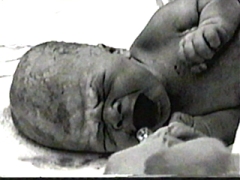 |
 |
 |
 |
| |
||||
The Pregnant ManA CBS 2 News Special Assignment The ability to carry a child and give birth is uniquely female. The ability to carry a child and give birth is uniquely female. But now, the very nature of pregnancy could dramatically change. In a CBS 2 News exclusive, Thelma Gutierrez explores the controversial procedure that can turn men into mothers. Special Assignment: The Pregnant Man aired Monday, May 24, 1999 at 11 p.m. For years, Hollywood has poked fun at the idea. The notion of men suffering from morning sickness and mood swings. But now, leading infertility scientists are saying it's more fact than fiction. "It would be undoubtedly technically possible," Dr. Robert Winston told CBS 2 News' Thelma Gutierrez. That's because the father's sperm and the mother's egg can be joined together in the lab. Dr. Winston is making the controversial suggestion of male pregnancy in his new book, "The IVF Revolution." "There's no question that there isn't anything special about the male that would prevent him from having a pregnancy implanted inside his abdomen," said Winston. Remember Little Louise Brown? She was the first test-tube baby born more than 20 years ago. Since then, reproductive technology has come a long way. Now, as England's most renowned fertility scientist, Dr. Winston says it can go farther with men carrying babies. "Well, you'd need to prime the male with hormones, certainly estrogen and progesterone. And then you would take an egg, fertilize it in-vitro. And then you'd have to find a suitable space in which to implant it," said Dr. Winston. After being implanted, a fertilized egg would attach itself to tissue, develop a placenta and then mature in the abdomen. But Rabbi Elliot Dorff, a bio-ethicist that teaches at the University of Judism, says he is sure male pregnancy will spark an ethical debate. "Every technology that we contemplate using is one that we have to evaluate before we jump in. And again, the fact that we can do something doesn't necessarily mean we ought to," he said. Rabbi Dorff says that even if the technology exists, most of us will continue to stick to childbirth the old-fashioned way, having mom go through the labor of love. Dr. Winston says male pregnancy is theoretically possible but he won't take that chance with his patients because of the risk of death. There's also the risk that the baby could be deformed. TalkBack!
|
|
 |
|
|
Retire Rich
 |

 |
||
|
12 p.m.
Woman 2 Woman One of the stars from "Judging Amy" 5 p.m. 6 p.m. 11 p.m.
|
||
 |
||
|
4-5 p.m.
Judge Judy Ruler Of The Free World! 8:00 p.m. 8:30 p.m.
9:00 p.m.
|
||
| |
||
 The ability to bear children defines womanhood.
The ability to bear children defines womanhood.  "The space is no different primary from that of a woman. The difficulty of course will be delivery, which would have to be by the equivalent of cesarean section. It would require abdominal operation," he said.
"The space is no different primary from that of a woman. The difficulty of course will be delivery, which would have to be by the equivalent of cesarean section. It would require abdominal operation," he said.  "The fact that it's there and it can be done doesn't mean that it should be done," Rabbit Dorff told Gutierrez. "The real question we have to ask ourselves is, is this the right way to have children?"
"The fact that it's there and it can be done doesn't mean that it should be done," Rabbit Dorff told Gutierrez. "The real question we have to ask ourselves is, is this the right way to have children?" 

